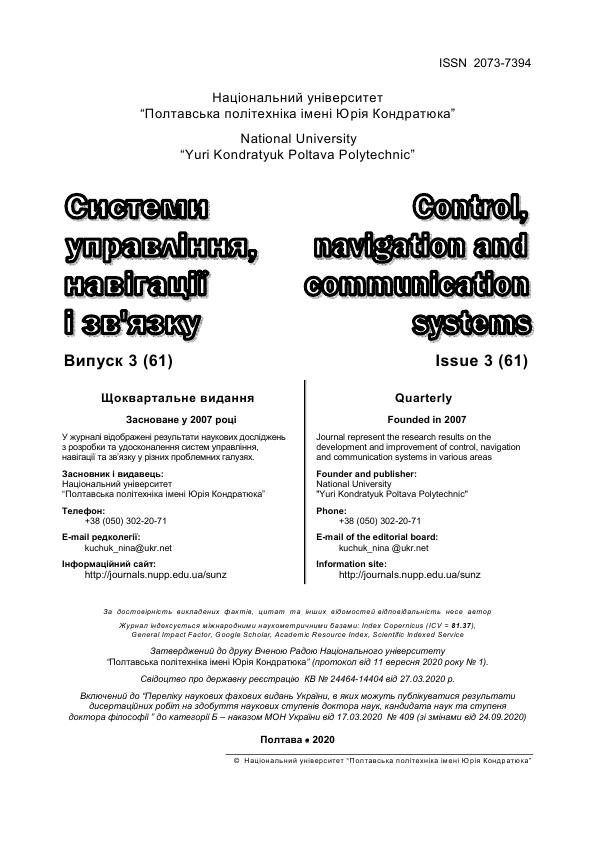GENETIC ALGORITHMS OF OPTIMIZATION IN THE PROBLEMS OF IRRIGATION SYSTEMS CONTROL
DOI:
https://doi.org/10.26906/SUNZ.2020.3.036Keywords:
genetic algorithms, optimization methods, correspondence function, chromosome, gene recombination, mu- tation, crossing, chromosome selectionAbstract
Today there is a tendency to increase the complexity of mathematical and formal models of real systems and control processes. This is due to the need to increase the adequacy of these models and take into account as many factors as possible that influence decision-making processes. Traditional methods of model building do not lead to satisfactory results when the description of the problem to be solved is inaccurate and incomplete from the beginning. The desire to obtain all the comprehensive information to build an accurate mathematical model of any complex real situation can only lead to a waste of time and money, because it may be impossible in principle. Until recently, two large classes of mathematical models and methods were used in the design and study of automated control systems and intelligent support systems for preparation and decision-making processes: one of them is represented by deterministic and the other by probabilistic models. Today there is a rapid development and increasing application in various fields of the third, completely new class of models and methods based on the principles of fuzzy set theory. A new direction has been developed, such as soft computing, which has made it possible to optimize fuzzy models. The use of optimization methods allowed to build adequate models of processes and systems, even with a rather rough initial fuzzy model. However, in systems based on a fuzzy approach, especially with a large number of variables, it is almost impossible to take into account the synergies that may occur when some specific values of individual variables appear together, and it is impossible to take into account differences in the importance of decision factors. In particular, in this work, genetic algorithms are used as optimization methods to minimize the distance between the desired and model result of the logical conclusion. Based on genetic algorithms for training fuzzy regression models, an intelligent decision support system for diagnosing irrigation regime parameters has been developed. Such a system has been introduced in the process of determining the terms and norms of irrigation for irrigation of vegetable crops of the nightshade family. The developed decision support system allows, depending on the choice of irrigation regime, to determine the need of plants for water and either get high yields against the background of rational water use, or save water resources with certain crop losses, which is economically feasible compared to feed costs additional volumes of irrigation water to achieve maximum yieldsDownloads
References
Ротштейн А.П. Интеллектуальные технологии идентификации: нечеткие множества, генетические алгоритмы, нейронные сети / Ротштейн А.П. - Винница: УНІВЕРСУМ - Вінниця, 1999. - 320 с.
Gen M. Genetic Algorithms and Engineering Design / Gen M., Cheng R. —John Wiley & Sons, New York, 1997. - 352 p.
Круглов В.В. Нечеткая логика и искусственные нейронные сети / Круглов В.В., Дли М.И., Голубов Р.Ю. — М.: Физматлит, 2001. — 224 с.
Леоненков А.В. Нечеткое моделирование в среде MATLAB и fuzzyTECH / Леоненков А.В. — СПб.: БХВ-Петербург, 2005. — 736 с.
Лисогоров К.С. Математичне моделювання і створення автоматизованих систем управління в зрошуваному землеробстві / Лисогоров К.С. — Херсон : Айлант, 2003. — 184 с.
Лєві Л.І. Синтез автоматизованої системи керування вологозабезпеченістю сільськогосподарських культур при підґрунтовому зволоженні // Вісник Полтавської державної аграрної академії / - No1 (24), 2019. - С. 201 - 204. http://doi.org/10.31210/visnyk2019.01.27
Раскин Л.Г. Нечеткая математика. Основы теории. Приложения / Раскин Л.Г., Серая О.В. – Х.: Парус, 2008. – 352 с.




